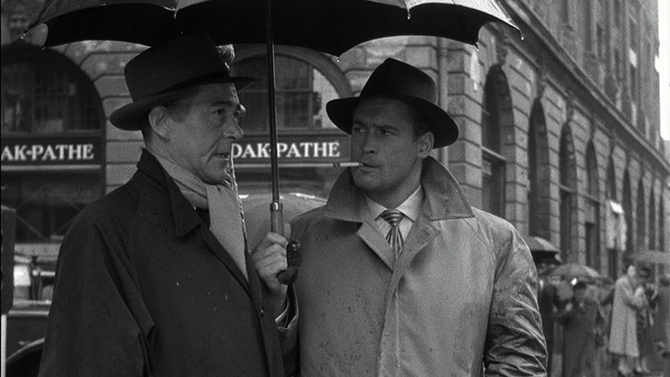Most scripts and movies are formed in one complete package, focusing on continuity, flow and character development as well as a definite beginning, middle and end. Yet some films are formed out of something different – a single shot, concept or idea that one then develops a picture around. It does not always work, but when it does, it is cinematic gold. This is the case for the 1955 French crime caper Rififi (originally titled Du Rififi Chez Les Hommes).
Director and screenplay adapter Jules Dassin (The Naked City), who was down on his luck at the time due to being blacklisted in Hollywood during the McCarthy Communist witch-hunt, left for France and was offered the chance to adapt and film the novel Rififi. Desperate, he accepted; despite the fact that the book was controversial and not his cup of tea. So, he latched on to one small scene, a robbery, which becomes the centerpiece of this film (Dassin admitted that the author of the novel, Auguste Le Breton, asked him where his book was within the screenplay – as he pulled out a gun while wearing a fortyesque outfit – the director laughed at the threatening yet caricatured figure and they became good friends).
This heart of the movie, an approximately thirty minute robbery of a jewelry store, is filmed without an actor saying a word or any music playing. The suspense is palpable, with the viewer silenced much like the professionals performing their intricate duties. We watch the clock much like they do, wondering if and when something will go wrong, as the hands tick past their allotted extraction time. All we hear are the sounds of the tools, muffled coughs, chipping cement – in its own way, the musical composition of the take. These scenes are filmed with such precision, it is like watching a complex yet perfectly performed ballet (much like the shoes the safecracker is wearing). It is during these key moments that the movie hits its stride.
That is not to say that there is nothing of worth at the beginning of the film. Though slowly paced, we are introduced to our characters: the leader and brains Tony le Stéphanois (Jean Servais), the muscle Jo le Suedois (Carl Möhner), the funny character and man with the original plan Mario Ferrati (Robert Manuel), and director Jules Dassin playing the safecracker César le Milanais. We also watch as they forge the intricacies of their plan, we learn of their past and of their present situations. Most significantly, we meet Tony’s former lover, Mado (Marie Sabouret), who, since her beau was sent to jail, is now connected to Pierre Grutter (Marcel Lupovici), the head of the Grutter gang and a night club owner. The two groups will clash throughout.
I will leave what happens after the robbery in the dark, allowing the viewer the chance to watch the ebbs and flows, twists and turns that occur at the end of the film. This film is an excellent picture that shows its influence on the modern crime thriller. Much like Stanley Kubrick’s The Killing (reviewed last summer), one can see how a motion picture like this has had an impact on almost every robbery flick after; from Reservoir Dogs to Drive.
Though none of the actors are well known, they all offer amazing performances. On top of the main cast, Jo’s young son Tonio (Dominique Maurin) is a hoot – a ball of energy who is fazed by nothing and is a treat to watch. The locale, Montmartre in Paris, is its own character, adding a realistic, beautiful and sometimes gritty flavour to the film.
Much like another one of my previous reviews, Diabolique, this film once again shows the freedom of sexuality allowed to be shown on screen compared to North American movies of that time. From rough treatment of women to skimpy see-through lingerie, this is something unique that would not be seen in Hollywood movies of this time.
Finally, there is one memorable scene between César and Tony – heartbreaking and real; written by Dassin to symbolize the Hollywood trials that he was named in that helped get him blacklisted; betrayed by his Hollywood compatriots.
Rififi is a superb motion picture that must be considered one of the great crime movies of all-time. Its depiction of the attempted perfect crime is up there with any of the other more well-known films in this genre. Enjoy this jewel of a movie; it won’t leave you sitting on the fence.
Rififi: 8.2
English Subtitles
Part of the Criterion Collection

